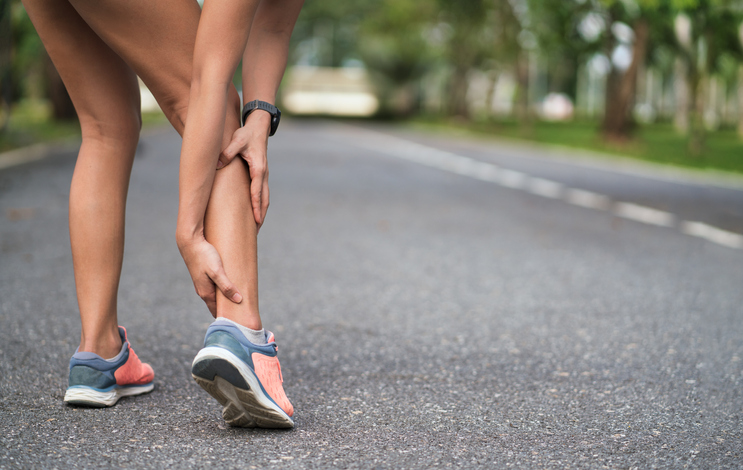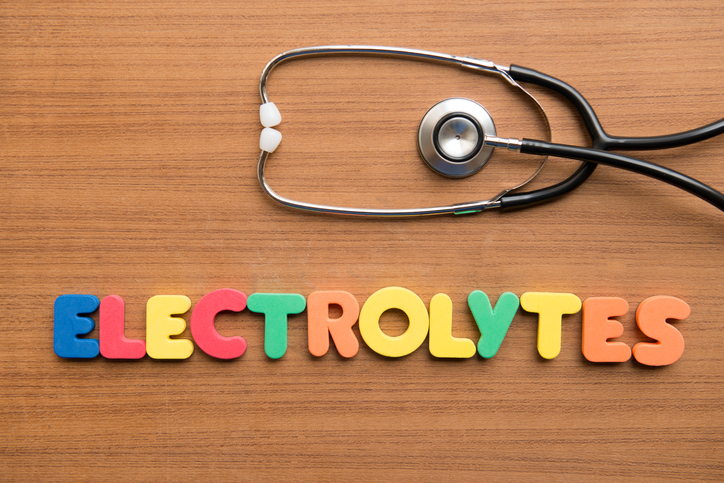Don’t Let Muscle Cramps Cramp Your Workout Style

By Joy Stephenson-Laws, J.D., Founder
It’s so discouraging to be in the middle of a really good workout, or, in my case, a golf game, and get derailed by a muscle cramp.
Also called muscle spasms or a ‘Charley/Charlie horse’ (when occurring in the legs), muscle cramps are defined by the National Institutes of Health (NIH) as sudden and involuntary contractions or spasms in one or more of your muscles. That sounds about right! To some, muscle cramps may just be a nuisance, but I believe that anything that interferes with you being physically active (which is such a key pillar to good health and wellness) must be addressed. And, of course, muscle cramps are uncomfortable!
If you are a physically active person who suffers from muscle cramps, you may turn to water, stretching and a sufficient warm-up exercise in order to help prevent these pesky cramps. These are good tools and, of course, hydration is very key, but you may be leaving out one very important component when it comes to stopping cramps in their tracks.
According to a recent study that was published in the Journal of the International Society of Sports Nutrition, researchers found evidence which suggested that people who drank plain water were more likely to suffer from muscle cramps both during and after exercise compared to people who drank electrolyte enhanced water.

And, again, if you think it’s no big deal, “Muscle cramps are a common painful condition affecting many people, including around 39 percent of marathon runners, 52 percent of rugby players and 60 percent of cyclists,” according to this Science Daily report that discusses the study.
It would be quite frustrating to suffer from a muscle cramp on race day after putting in the grueling hours of training for a marathon or have to cut a beautiful bike ride with your family short because the cramps are just too bad.
What are electrolytes?
To put it simply, electrolytes are minerals. If you are a regular reader of pH Labs blogs, you know that I am a huge fan of minerals. It’s not that I play favorites with my nutrients. The six groups of nutrients we all need and are equally important to our health and wellbeing include:
I do, however, believe that the importance of minerals often gets overlooked. For example, many of you may know that vitamin C is important to our health, but do you know the importance of magnesium or chloride?
Calcium, chloride, magnesium, potassium and sodium are all electrolytes. We get these electrolytes from both food and fluids.
“Electrolytes are minerals in your body that have an electric charge. They are in your blood, urine, tissues, and other body fluids,” according to the National Institutes of Health (NIH).
“The levels of electrolytes in your body can become too low or too high. This can happen when the amount of water in your body changes. The amount of water that you take in should equal the amount you lose.”
And, of course, we lose a lot of water through sweating when we work out (especially vigorously). So many of us simply rehydrate with water without realizing that the lack of electrolytes (because we lose those too when we sweat) in the water we are drinking may be leading to muscle cramps.
Electrolytes have a few important roles that they play within our bodies. According to the NIH, electrolytes:
- Balance the amount of water in the body
- Balance the body’s pH level (the acid-base balance)
- Move nutrients into the body’s cells
- Transports waste out of the cells
- Ensures the nerves, muscles, heart and brain work optimally
Clearly electrolytes are very important!
It is also very important to note that the report discussing the study mentioned earlier discusses how drinking water can actually dilute the electrolyte concentration in the body. You never want to be dehydrated, but it is also important to hydrate without depleting what your body needs - electrolytes!
Should I reach for a sports drink?
I’m personally not the biggest fan of sugary sports drinks or even the sugar-free ones (these often have unbeneficial additives). There is a wide variety of electrolyte powders out there that you can add to your water. Speak with a competent healthcare professional about the best option for you.
I also think that a major takeaway from this is how important it is to fuel your body properly both before and after working out. Some people do not like to eat a lot before working out, and that’s understandable. But you might want to eat some nuts, a banana or some Greek yogurt (just to name a few possible options) right before physical activity so that when you sweat and replenish with plain water your body is in a better position to not be completely depleted of all its electrolytes. It is also very important to eat properly soon after you are finished exercising. Getting in a good protein shake or some fruit and healthy carbs (such as a sweet potato) may help you feel reenergized after a workout and prevent those pesky muscle cramps.
Lastly, I highly advise taking routine nutrient tests (especially if you suffer from muscle cramps) in order to determine any nutrient imbalances or deficiencies. The truth is that most of us do! Once you get your results, you can discuss with a competent healthcare professional how you can adjust your diet to ensure you get all of the electrolytes and other major nutrients that your body needs to function at its best. You may even need to implement supplements into your routine. A competent healthcare professional can recommend good quality supplements that are best for you.
Keep up those workouts, and don’t let muscle cramps cramp your style!
Enjoy your healthy life!
Disclaimer: This article is not intended to provide medical advice. Please consult with your doctor or another competent healthcare practitioner to get specific medical advice for your situation.
The pH professional health care team includes recognized experts from a variety of health care and related disciplines, including physicians, attorneys, nutritionists, nurses and certified fitness instructors. This team also includes the members of the pH Medical Advisory Board, which constantly monitors all pH programs, products and services. To learn more about the pH Medical Advisory Board, click here.







